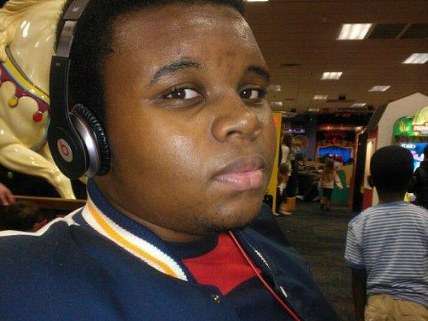Officer Who Shot Mike Brown Faces 'Threats'? But Police Are Quick to Name Those Who Shoot Cops.

Blaming threats against the police officer who killed unarmed Michael Brown on Saturday, Ferguson, Missouri, Police Chief Tom Jackson says he won't release the shooter's name unless charges are filed or he's ordered to by a judge. Does anybody believe he would be so reticent to point the finger if the situation were reversed and an officer was killed by a civilian?
In fact, when have police ever been especially cautious about naming people they believe have targeted one of their own?
Ferguson doesn't have any officers listed at the Officer Down Memorial Page; hopefully that accurately represents the safety of the job. But when St. Louis Police Department Officer Daryl Hall was killed in a gun battle in 2011, officials were quick to name Asif Blake as the suspect. True, Blake was also killed in the incident, but he certainly had family who might have been subject to "threats."
The St. Louis Police Department did withhold the name of Antonio Andrews until he was charged with the shooting death of Officer Norvelle Brown in 2007—but Andrews was 15 at the time, and initially subject to rules regarding young offenders (he was charged as an adult).
The Missouri Highway Patrol named Lance Shockley "a person of interest" in the 2005 murder of Sergeant Carl Dewayne Graham Jr. (he was later convicted of the crime).
University City, Missouri, police, quickly identified Todd L. Shepard as the suspect in the 2008 shooting of Sergeant Michael R. King (he was later convicted).
And it's not just common practice in Missouri. Just weeks ago, Mendota Heights, Minnesota police promptly named Brian George Fitch Sr. as a "person of interest" in the shooting death of Officer Scott Patrick. (He was later charged.)
In 2011, Forth Worth, Texas, police named Joe Nathan Haywood III in the shooting of Officer Clifford Hankins (he was later convicted).
In general, law enforcement agencies are more than happy to name suspects, or mere persons of interest, and let the people and their associates take their chances. The leave the named, like falsely accused Olympic bombing suspect Richard Jewell, to pick up whatever pieces they can after the fact if it turns out that their hands are clean of the crime to which they've been linked.
Jackson's concern for officer safety isn't isolated. Salinas, California, was called out earlier this year for refusing to release the names of any officers involved in 2014 shootings because "disclosure might compromise their safety." This even after the state Supreme Court ruled against blanket anonymity for police involved in shooting incidents.
The fact that the court had to rule on the matter is a statement in itself.
The police chief in Hope Mills, North Carolina, withheld the names of officers involved in a shooting over a"concern for retaliation."
In 2010, Baltimore, Maryland, officials announced they would begin releasing the names of officers who discharge their firearms—after a 48-hour delay "that allows police to put safeguards in place."
Not naming, or delaying naming, uncharged suspects in crimes may be acceptable practice if it's applied to everybody. But it also has special risks when practiced with goverment agents, like police officers, since it allows officials to control the flow of information. Ferguson's Chief Jackson says the officer who killed Brown has facial injuries from an altercation that let to the shooting—but the public has no way of independently checking that claim. His department also says it's waiting on a toxicology test on Brown, allowing police to insinuate that he may have been high (and to use any positive results in their favor if he was).
Meanwhile, Brown's family, friends, and the public at large can't so much as Google the name of the officer who shot him.


Show Comments (182)